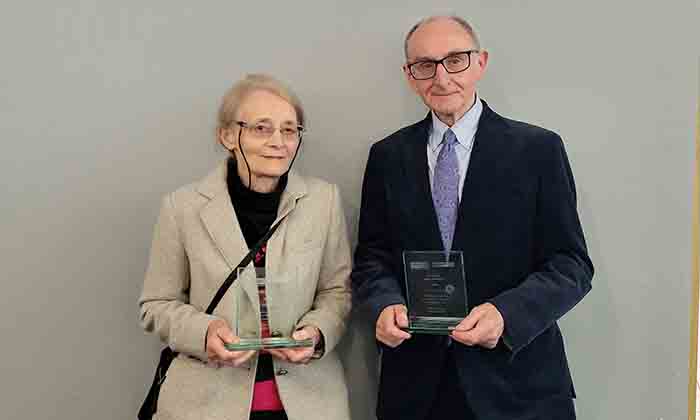Faculty of Biology, Medicine and Health thanks long-serving museum volunteers
05 Dec 2024
Peter and Julie Mohr retire from their volunteering duties after more than 20 years involvement with the Museum of Medicine and Health

Thank you to Peter Mohr and Patience Julia (known to all as Julie) Mohr, who retire from their volunteering duties at the Museum of Medicine and Health. Peter and Julie’s contributions to Social Responsibility have continued for over 20 years, most recently winning the special bicentenary category at the Patient and Public Involvement and Engagement (PPIE) Celebration event 2024.
They have contributed to the upkeep, research and access to Faculty heritage. Inspiring respect and friendship from colleagues, academics and students many times over, we thank them for their dedication. Peter and Julie’s contributions extend beyond the museum, in their efforts to bridge the gap between medicine and social issues through research and publication.
Peter is a retired neurologist and alumnus of both the Manchester Medical School and the University's Centre for History of Science, Technology, and Medicine (CHSTM). After retiring, he and Julie dedicated more time to the museum, creating a computer catalogue and moving the collection to the former Art in Medicine Department, which provided a better space for storage and display. Their meticulous attention to detail and passion for making medical history accessible and engaging, has transformed the museum into a vibrant hub for education and community engagement.
Reflecting on almost a decade working closely with both Peter and Julie, Steph Seville, the museum’s Heritage Officer said: “Peter’s enthusiasm for routing out stories, plus Julie’s amazing memory, has made for some fantastic revelations, anecdotes and knowledge. I am very lucky to have learnt a lot from them both.”
Peter hopes that most medical students and doctors can increase their interest in medical history, emphasising that history is important and that objects can help foster this interest.
If Peter could say one thing to people, he would say, “Be a problem solver – not a problem maker.”
The Faculty extends a heartfelt thanks for their unwavering commitment to preserving medical heritage and inspiring generations of students, scholars, and visitors. We wish them the best in their retirement and other interests, confident that their legacy will continue to foster an interest in medical history, cultivate problem solvers, and encourage a deeper understanding of healthcare’s intersection with society.
Read the full article on the BMH Social Responsibility blog
